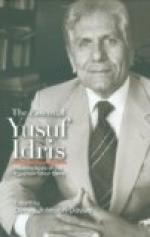|
This section contains 6,151 words (approx. 21 pages at 300 words per page) |

|
SOURCE: Kirecci, M. Akif. “Political Criticism in the Short Stories of Yusuf Idris: ‘Innocence’ and ‘19502’.” The Massachusetts Review 42, no. 4 (winter 2001): 672-88.
In the following essay, Kirecci contends that “Innocence” and “19502” “strongly reflect the author's perception of Egyptian political life.”
This article analyzes two short stories by Yusuf Idris (1927-1991), commonly regarded as Egypt's master of this genre. These two stories, “Innocence” (“Bara'ah”) and “19502,” not only vividly represent the relationship between literature and politics, but also are fine examples of Idris' artistic style. Indeed, his literary works as a whole reflect Egypt's culminating experiences and struggles along the path to becoming an independent modern nation. I thus argue that an intellectual can assert his political views via literature as effectively as by engaging in politics itself—if not more so.
In “Bara'ah,” Idris visualizes the visit of Egyptian President Anwar al-Sadat to Israel. The message is clear: he does...
|
This section contains 6,151 words (approx. 21 pages at 300 words per page) |

|


